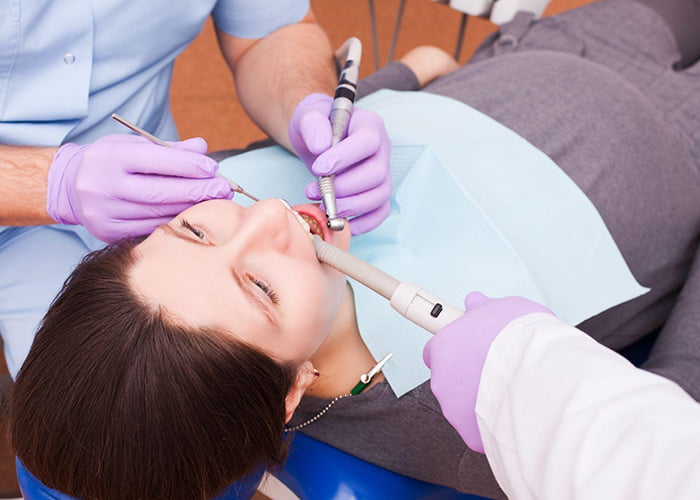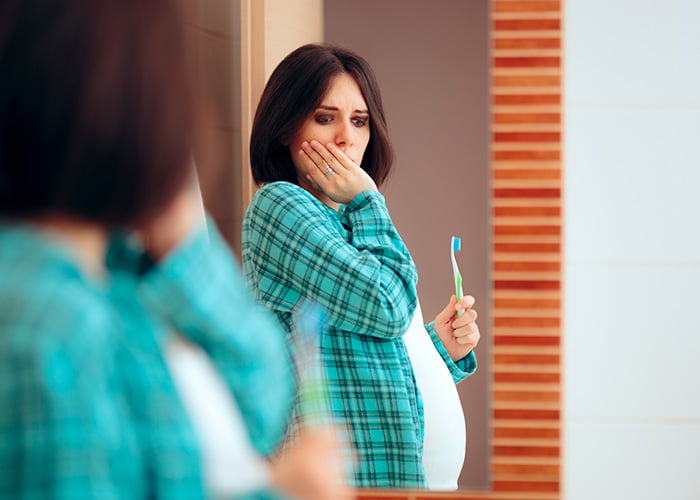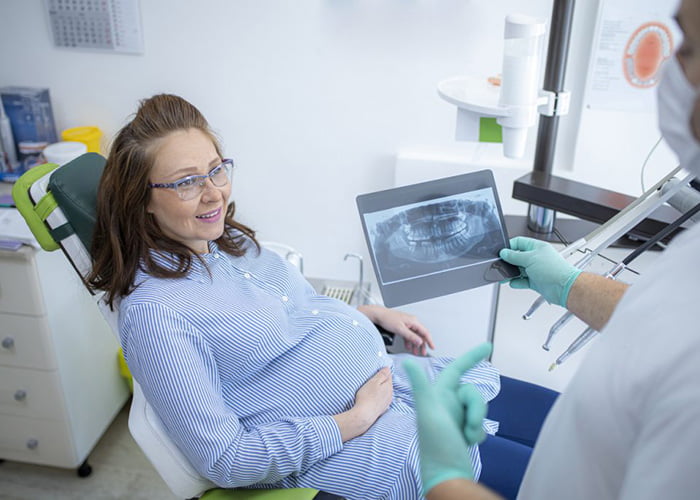One of the explanations why so many individuals worry about tooth extraction during pregnancy is because of outdated beliefs regarding the subject of dental treatment for expectant women. Since treating pregnant patients poses a risk, many dentists will refuse to do so, regardless of how serious the patient’s dental issue may be. You should visit the dentist when pregnant in addition to being able. Leaving gum disease, tooth decay, and other oral health issues untreated can be hazardous. Your oral health has a significant impact on your general health, which means that your kid may also be significantly impacted. We encourage scheduling routine dental visits even if you are not pregnant.
Why are pregnant women susceptible to oral health conditions?
Your hormone levels rise as your child grows and develops, which might cause toothaches and other mouth problems like:
- Dental plaque: Pregnant women are more likely to develop more plaque due to hormonal changes. Plaque can develop into tartar and raise the risk of tooth decay if left untreated.
- Loose teeth: Many pregnant women endure nausea and vomiting during the first trimester. Stomach acid can come into contact with tooth enamel, causing enamel erosion and easily resulting in tooth decay as a result of improper brushing practices.
- Gingivitis during pregnancy: Most pregnant women are susceptible to gingivitis during pregnancy due to hormonal changes. As a result, the gums become more sore and susceptible to major dental issues.
Read more: Why are emergency tooth extractions needed?
Is it safe to perform tooth extraction during pregnancy?
Dentists usually attempt to save your tooth if at all possible; extractions are only used as a last option. However, if your tooth has been severely compromised by decay or trauma and cannot be restored, it should be extracted to protect your oral health. At any point in pregnancy, extractions can be done.
For both mother and unborn child, tooth extraction during pregnancy is a safe dental treatment. Additionally, you should visit a dental office that is fully furnished with cutting-edge tools and staffed by a team of highly skilled dentists so that you can experience a rapid, painless tooth extraction.
The ideal time for tooth extraction while pregnant

The right timing is crucial when having a tooth pulled while pregnant. The American Pregnancy Association advises scheduling any obligatory dental procedures during the second trimester and delaying any optional procedures until after birth.
By the third trimester, you could find it extremely uncomfortable to recline or lie down while getting the tooth extracted. Additionally, you can undergo dental procedures during the first trimester, and all of the pregnancies looked at in the JADA study had first-trimester local anesthetic.
No matter which trimester you are in, an extraction would still be done if you were experiencing a serious dental emergency and needed to have the tooth removed as quickly as possible to reduce the risk of infection.
Find out more: Is Tooth Extraction Painful?
Home remedies for tooth pain after extraction
You can attempt the following in addition to taking the medication your dentist has prescribed to help you feel more at ease following tooth extraction:
- When you’re sleeping, elevate your head with pillows.
- Avoid strenuous activities and get plenty of rest.
- Consume soft, watery foods like soup or oatmeal.
- The affected region should be treated with hot or cold compresses.
- To prevent exerting force on your teeth or gums, avoid using a straw.
- Additionally, you should practice good oral hygiene to lower the possibility of developing an infection.

Are Wisdom Teeth X-Rays Safe During Pregnancy?
Being exposed to radiation from wisdom teeth x-rays is one of the most frequent worries individuals have about visiting the dentist while pregnant.
Modern dental x-rays, on the other hand, use extremely low levels of radiation, and a single exposure is typically not high enough to have any negative consequences on the fetus’s development. Additionally, your dentist will use a thyroid guard and lead apron to protect your infant from radiation exposure.
Even though x-rays are safe, if you’re merely getting a normal checkup, your dentist may still advise against getting them during the first trimester. However, x-rays might still be required if you have a dental emergency or intense, generalized pain, so that your dentist can efficiently arrange your treatment.

Is Oral Surgery Anesthesia Safe During Pregnancy?
Anesthesia can still be used safely to help you relax and dull the pain if you need to have a dental operation while expecting. You must let your dentist know you are expecting so they can select the right anesthetics and set the proper dosages.
Ask your dentist if you have any questions or concerns about the type of anesthetic they’re using if you have any questions or concerns about the anesthetic they’re using. Anesthetics containing felypressin should be avoided during pregnancy because this chemical constricts the blood vessels.
Your dentist will use the least amount of anesthesia necessary for the type of operation being done, while still providing you with enough to make you feel at ease. Your body and your unborn child will be less stressed when you’re at ease.
Why should I visit the dentist before getting pregnant?
Before becoming pregnant, attempt to schedule a dentist appointment. This will allow for a thorough examination of your gum tissue, professional cleaning of your teeth, and the early treatment of any oral health issues that may exist due to your pregnancy.
Tooth extraction during pregnancy is completely safe for both you and your baby. However, to avoid health problems, you should take good care of your teeth. Hopefully, the information in this article has made you feel more secure about pulling teeth while pregnant. Contact us through the tooth extraction Marysville website.



